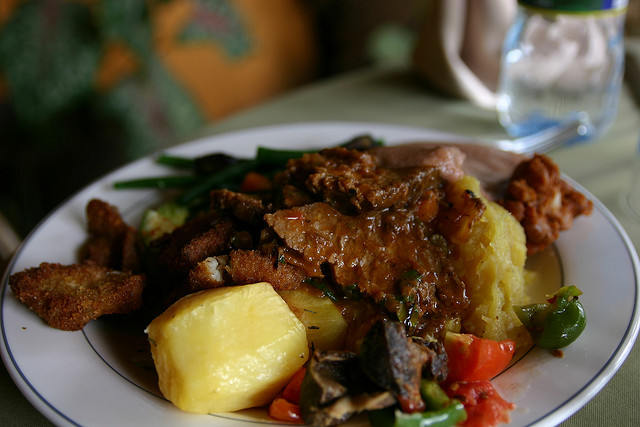More than half of Ugandans mention poverty and food insecurity as the main problems facing their households: 1 out of 4 cite poverty directly (26%), and a further 1 out of 7 mention hunger or drought (15%) and the high cost of living (14%).
A majority of citizens report that they have faced food insecurity in the past three months: 7 out of 10 say that they had to skip a meal because of a lack of food (75%), that their household ran out of food (69%), and they were hungry but did not eat (67%). Even higher numbers have been worried about running out of food in the past three months (85%). Food stress is markedly higher in Uganda than in Kenya across all of these measures.
Experiences of food security also vary within the country and by group. In both urban (45%) and rural (51%) areas, and in wealthier households (39%) as well as poorer ones (60%), Ugandans often go hungry. The sharpest variations come when considering specific sub-regions. In Karamoja, five out of six residents (85%) have gone a whole day without food in the three months before the survey, while in Lango one out ten residents (9%) have experienced this problem.
And only 1 out of 5 citizens (22%) report having enough income to meet their needs on a daily basis.
As a result, a significant majority of Ugandans are dissatisfied with the country’s direction in terms of economic management (84%) and with the creation of job and income generation opportunities (71%).
These findings were released by Twaweza in a research brief titled Under pressure? Ugandans’ opinions and experiences of poverty and financial inclusion. The brief is based on data from Sauti za Wananchi, Africa’s first nationally representative high-frequency mobile phone survey. The findings are based on data collected from 1,925 respondents across Uganda in October 2017.
Financial inclusion can provide a route for citizens to manage their finances better. However, only 1 out of 6 Ugandans have a bank account (16%) and this proportion has not grown in recent years. In addition, fewer than 1 out of 6 has a debit card (14%) or an account with a SACCO (14%), and very few have an account with a microfinance institution (4%), a pension (2%), an insurance product (2%) or a credit card (1%).
Although 1 out of 3 citizens have borrowed money in the past five years, these loans tend to be taken from informal groups (30%) rather than regulated financial institutions. Also, men (40%) are more likely to borrow money than women (29%).
However mobile money is accessible to all. Two out of three citizens report having a mobile money account (68%). And mobile money is available to groups often left behind by other financial services and products, namely women and the young.
Marie Nanyanzi, Sauti za Wananchi Officer at Twaweza, said “These data reveal a very challenging picture: our citizens are hungry and are struggling financially. And a large majority are unhappy with the way in which the economy is being managed.”
“Although financial inclusion might help them to cope through difficult times,” she continued “there are inequalities in access. But, mobile money emerges as a great equalizer. Even among traditionally excluded groups, such as women and the young, mobile money services offer a pathway to life-improving loans, savings and other financial services.”
Dr Mary Goretti Nakabugo of Twaweza, said: “Ordinary Ugandans are working very hard to provide for themselves and their children, but they are struggling to achieve economic security. The government can step in to support their efforts and ensure that no one is left behind as the country forges ahead.”











